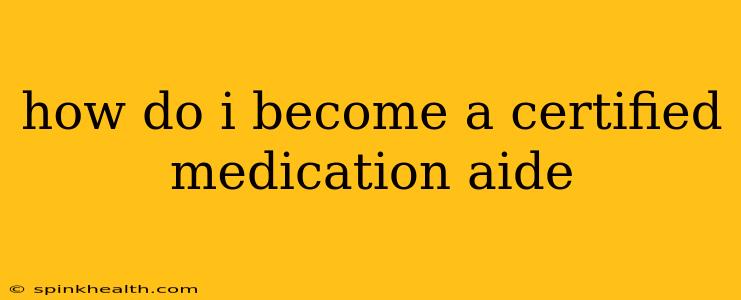The Journey to Becoming a Certified Medication Aide: A Story of Compassion and Skill
Becoming a Certified Medication Aide (CMA) isn't just about ticking boxes on a checklist; it's about embarking on a journey fueled by compassion, dedication, and a genuine desire to help others. It's a path that blends practical training with rigorous certification, ultimately empowering you to play a vital role in improving the lives of individuals in need. This isn't just a job; it's a calling. Let's explore the steps involved in answering the burning question: "How do I become a certified medication aide?"
1. What Does a CMA Do? Understanding the Role
Before diving into the process, it's crucial to understand the responsibilities of a CMA. CMAs are vital members of healthcare teams, typically working in assisted living facilities, nursing homes, or other long-term care settings. Their primary role revolves around administering medications to residents under the supervision of a licensed nurse. This goes beyond simply handing out pills; it involves:
- Accurate medication administration: This requires meticulous attention to detail, ensuring the right medication, dosage, and timing are followed precisely.
- Monitoring residents: CMAs observe residents for any adverse reactions to medication and report any concerns to the supervising nurse.
- Maintaining accurate records: Documentation is key. CMAs meticulously record medication administration and any relevant observations.
- Building rapport with residents: A compassionate approach is vital, building trust and providing comfort to residents during medication administration.
2. Educational Requirements: The Foundation of Your Career
The path to CMA certification varies slightly depending on your location. However, the common thread is the requirement for a completed training program. These programs typically cover:
- Medication administration techniques: Learning the safe and effective ways to administer various medications (oral, topical, etc.).
- Pharmacology basics: Gaining a foundational understanding of how medications work, their potential side effects, and interactions.
- Legal and ethical considerations: Understanding the regulations governing medication administration and the ethical responsibilities of a CMA.
- Record-keeping and documentation: Mastering the essential skills of accurate and thorough record-keeping.
Some states might require a high school diploma or equivalent, while others may have more lenient requirements. Research your specific state's regulations to determine the exact educational prerequisites.
3. Finding a Reputable Training Program: Choosing Your Path
Choosing the right training program is a crucial step. Look for programs accredited by recognized organizations within your state. Consider factors such as:
- Accreditation: Ensures the program meets certain quality standards.
- Instructor experience: Experienced instructors can provide valuable guidance and support.
- Curriculum: The program should comprehensively cover all aspects of medication administration.
- Hands-on training: Practical experience is essential for developing competence and confidence.
- Job placement assistance: Some programs offer assistance in finding employment after graduation.
4. The Certification Exam: Putting Your Knowledge to the Test
Once you've completed your training program, you'll need to pass a certification exam. This exam tests your knowledge and understanding of medication administration, pharmacology, and related topics. The specific requirements and content of the exam will vary depending on your state and the certifying organization. Thorough preparation is key to success.
5. Maintaining Your Certification: Ongoing Commitment to Excellence
Certification is not a one-time achievement. Most states require continuing education credits to maintain your certification. This ensures you stay up-to-date on the latest medication practices, regulations, and advancements in the field.
What are the different types of medication aides?
There isn't a widely recognized system of "different types" of medication aides. The core responsibilities remain consistent across various settings. However, the specific tasks and level of supervision might vary slightly depending on the facility's policies and the resident's individual needs. For example, some CMAs may work primarily with residents requiring oral medications, while others may handle a broader range of medications and administration methods.
How long does it take to become a certified medication aide?
The time it takes varies depending on the program, but most training programs range from a few weeks to several months. After completing the program, there’s the additional time needed to prepare for and take the certification exam.
What is the job outlook for Certified Medication Aides?
The demand for CMAs is steadily increasing, driven by the growing aging population and the increasing need for long-term care services. This creates promising career opportunities for those seeking fulfilling and rewarding work in healthcare.
Becoming a Certified Medication Aide is a journey that requires dedication and commitment, but the rewards are immense. You'll not only gain valuable skills and experience, but you'll also make a meaningful difference in the lives of others. So, if you're ready to embark on this path, take the first step, research your local regulations, find a reputable training program, and start your journey toward becoming a compassionate and skilled CMA.

